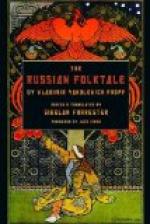III. The Humorous Tale
The humorous tale is one of the most pleasing to the little child. It pleases everybody, but it suits him especially because the essence of humor is a mixture of love and surprise, and both appeal to the child completely. Humor brings joy into the world, so does the little child, their very existence is a harmony. Humor sees contrasts, shows good sense, and feels compassion. It stimulates curiosity. Its laughter is impersonal and has a social and spiritual effect. It acts like fresh air, it clarifies the atmosphere of the mind and it enables one to see things in a sharply defined light. It reveals character; it breaks up a situation, reconstructs it, and so views life, interprets it. It plays with life, it frees the spirit, and it invigorates the soul.
Speaking of humor, Thackeray, in “A Grumble About Christmas Books,” 1847, considered that the motto for humor should be the same as the talisman worn by the Prioress in Chaucer:—
About hire arm a broche
of gold ful shene,
On which was first ywritten
a crowned A,
And after, Amor vincit
omnia.
He continued: “The works of the real humorist always have this sacred press-mark, I think. Try Shakespeare, first of all, Cervantes, Addison, poor Dick Steele, and dear Harry Fielding, the tender and delightful Jean Paul, Sterne, and Scott,—and Love is the humorist’s best characteristic and gives that charming ring to their laughter in which all the good-natured world joins in chorus.”
The humorous element for children appears in the repetition of phrases such as we find in Three Bears, Three Pigs, and Three Billy-Goats; in the contrast in the change of voice so noticeable also in these three tales; in the contrast of ideas so conspicuous in Kipling’s Elephant’s Child; and in the element of surprise so evident when Johnny Cake is eaten by the Fox, or when Little Hen eats the bread, or when Little Pig outwits the Wolf. The humorous element for children also lies in the incongruous, the exaggerated, or in the grotesque, so well displayed in Lear’s Nonsense Rhymes, and much of the charm of Alice in Wonderland. The humorous element must change accordingly for older children, who become surprised less easily, and whose tales therefore, in order to surprise, must have more clever ideas and more subtle fancy.
The Musicians of Bremen is a good type of humorous tale. It shows all the elements of true humor. Its philosophy is healthy; it views life as a whole and escapes tragedy by seeing the comic situation in the midst of trouble. It is full of the social good-comradeship which is a condition of humor. It possesses a suspense that is unusual, and is a series of surprises with one grand surprise to the robbers at their feast as its climax. The Donkey is a noble hero who breathes a spirit of courage like




